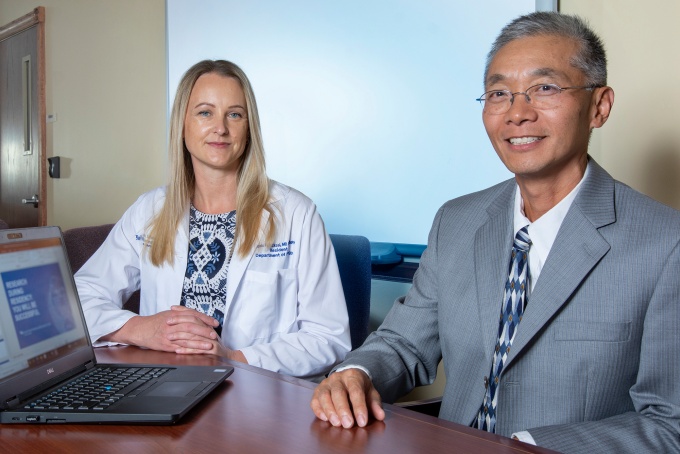Research and Scholarship

Faculty member, Ichabod Jung, MD, right, is enthusiastic about helping trainees like Angela Hacksel, MD, maximize their analytical skills while they conduct research spanning the range of conditions affecting the genitourinary tract.
Our residency has a strong research component that provides you with opportunities to embark on projects matched to your interests and goals.
We enable you to participate in every facet of academic research, preparing you to pursue a career in academic medicine. Are you seeking a career in private practice? The concepts you learn during your research experience will enhance your approach to patient care.
Our residents typically select a clinically related research topic. If you train in our program, you can collaborate with seasoned faculty on projects investigating the development, treatment and prevention of urologic diseases and conditions.
We’ll require you to complete at least one research project during residency training. Notably, many of our residents complete two or three projects. As appropriate, we’ll encourage you to submit your manuscript to peer-reviewed journals.
Research Endeavors by Year
To ensure that you have sufficient time to engage in meaningful and productive research, we include ample time for research in each year of training.
PGY-1
We make sure you’re involved in research from the start of your training. During your first year, you’ll work with our research director to discover your research interests.
Expect to work on a minimum of one research project as a secondary author, working alongside a senior resident. By the end of your first year, you should have an understanding of your research interests and the work involved in research. In subsequent training years, you’ll have a larger role in research.
PGY-2 and PGY-3
By your second and third years of training you should have a solid understanding of your research interests. These are the years to take the lead on at least one research project of your own.
PGY-4 and PGY-5
During your last two years of residency, in addition to leading a research project of your own, you’ll enhance your research skills by serving as senior resident on at least one other research project with a junior resident.
Supportive Faculty Mentors
Resident research projects are structured around didactic sessions with our:
- Attending urologists.
- Dedicated urology resident research director.
- Support staff.
Bi-monthly meetings will nurture your research projects. Our faculty will support you as you transform your work from a proposal to a full-fledged presentation or peer-reviewed publication.
Flexible Research Options
As a resident in our program, you’ll have plenty of opportunities to undertake translational, clinical or basic science projects.
Research opportunities also exist outside of our department, and we encourage you to pursue them. Our residents have developed fruitful joint relationships with other departments and UB schools.
Basic and translational research
If you aim to engage in basic research, we’ll support your interests.
If you are interested in translational research, we’re proud to say: Our residents have engaged in successful translational research endeavors. For instance, some of our residents formed an S corporation and have tagged foley catheters via QR-identification to minimize catheter associated infections. Collaborating with biomedical engineering experts and the UB School of Law’s Entrepreneurship Law Center Clinic, they worked to develop and patent the device.
You, too, will have the opportunity to conduct basic research and translate it to the bedside if you train in our program.
Clinical research
Are you interested in clinical research? There are numerous hospitals and outpatient sites in the greater Buffalo area, and a large patient base is captured by electronic health records and databases.
You will have the opportunity to perform epidemiologic and clinical studies with data from these sources.
You also have the ability to perform clinical trials — after receiving institutional review board approval — with faculty from our department.
Hone Your Presentation Skills
We know the importance of attending conferences. They can help you build your reputation as an expert in the field, and they keep you abreast of the latest breakthroughs and urologic advances. Further, they introduce you to potential collaborators and connections, they help infuse new ideas into your practice, and they give you valuable opportunities to present your research.
That’s why we’ll expect you to present your research at three main urologic annual meetings.
Our residents have presented at:
- annual meeting of the American Urological Association (AUA): prestigious national meeting in the spring, which is a key networking opportunity
- regional meeting held by the Northeastern Section of the AUA: includes programs from Western New York, Ontario and Pennsylvania
- Celebration of Scholarship at the Jacobs School of Medicine and Biomedical Sciences: an annual research poster session for residents, fellows, medical students and junior faculty
- annual Upstate New York Urological Association Urology Resident Research Day: provides opportunities to learn from and meet urology faculty and residents from Syracuse, Rochester, Buffalo, Albany and Queens
When you present at conferences — whether it is a podium or poster presentation — we will provide you with full support to ensure you are equipped to attend. We’ll cover the cost of your transportation, hotel accommodations and food expenses.